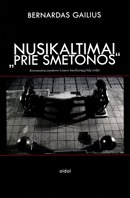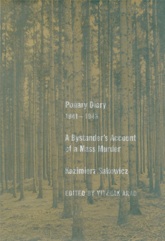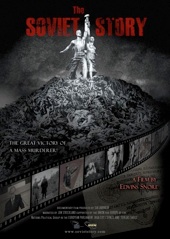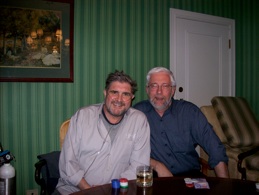This is a review I wrote for the American academic journal, Lituanus, in 2009. I’ve shortened the review slightly and made a few other revisions. The piece gives a summary of various partisan texts that I used as source material in the writing of my novel.
The Diary of a Partisan
Lionginas Baliukevicius
A year in the life of the postwar Lithuanian resistance fighter Dzukas
182 pp
Translated by Irena Blekys and Lijana Holmes
Additional Material translated by Petras Pagojus
Vilnius, 2008

Estonians, Latvians, Lithuanians, and Ukrainians are intensely aware of the history of the “forest brothers” who fought a doomed guerilla war against the Soviets from 1944 into the nineteen fifties. To say the West knows little of them is an understatement, and those who do know are not always sympathetic. Not long ago, I was having coffee with a friend who had only had heard of the Lithuanian partisans as “fascist bandits.” He was skeptical about my claim that tens of thousands of young men and women had fought the Soviets not because they were war criminals themselves, but because they were defending their homeland and believed it was better to die fighting than be deported to the north.
It’s an uphill battle getting the story out after decades of Soviet disinformation. And the story remains contentious to some, if only because there were handfuls of German soldiers among the partisans in the early stages of the resistance.
The partisan diary under discussion here is intensely melancholy, shot through with the knowledge that the massive partisan movement was crumbling by 1948 and 1949, even as it finally achieved a unified national command. At one point, Baliukevicius was promoted to the leadership of the partisans in the south, whom he said now consisted of 1,000 dead and 250 living. Those numbers would soon get worse. Of the approximately 140 partisans named in the diary, the vast majority would die in 1949, and most of the others, like Baliukevicius himself, in 1950.
This is a story of decline and fall, but it needs to be set in a context.
There has been a vast movement of study and publication of partisan materials since Lithuania’s independence in 1991. Where once we had only Juozas Luksas’s Partizanai and some historical overviews, now we have dozens and dozens of memoirs, monographs, in-depth studies, and even on-going magazine publications. It’s impossible for anyone but a determined historian to sty on top of all this material, but some of the stories stand out, and this diary is one of them. It is one of the five or six most important first person accounts of partisan activity and deserves a place of prominence among them.
Here are a brief descriptions of some of the others, which might be better places for the uninitiated reader to begin. Sadly, only one of the other partisan memoir named below has been translated into English.
The most prominent partisan writer of them all is Juozas Luksa, known as Daumantas, among other code names, a handsome young man who fought heroically and then in 1947 found his way out of the country against impossible odds and went to Sweden, Germany and France to seek help from the West. Marooned in Paris for a time, he wrote the first popular chronicle about the partisan war he had left behind. Luksa fell in love and married in Paris, but left his new wife behind in order to use American help to parachute into Lithuania in 1950, where he was betrayed by a former comrade and killed a year later. For decades, his book, Partizanai (The Partisans) was a stirring record of the partisan battle on a soldier’s level and the only one translated into English. To add to the romantic tragedy of this story, a posthumous book of love letters to his wife was also been published.
A new translation of Luksa’s book, Forest Brothers, has just come out, translated by Laima Vince.
When it comes to dashing, courageous, and tragic partisan heroes, a close second to Luksa has to be Adolfas Ramanauskas, known as Vanagas, who commanded hundreds of partisans in the south of Lithuania and who, in order to buck up the morale of his men, seized the ancient town of Merkine for a day, and lived to record the names and stories of 41 of his fellow soldiers from that action, all of whom subsequently died.
If Ramanauskas and Luksa are romantic heroes, doomed yet noble, their darker counterpart is Jonas Deksnys, a brave fighter but eventual traitor so vividly described in the late Liutas Mockunas’s Pavareges herojus (The Tired Hero), also untranslated. Deksnys seemed to live a charmed life, crossing the border to freedom twice and heading an information bureau in Stockholm. But he was caught on his third reentry into Lithuania, turned, and used for purposes of disinformation. He lived out his last days as a pathetic drunk, a habitué of the Hotel Neringa bar in Vilnius, a broken character out of Graham Greene or John Le Carre.
If these three most prominent partisans came from the upper echelons of the movement, others were less involved in the organization and propaganda and more ordinary, but lovely in the manner of Shakespearean secondary characters. Juozas Jakavonis, known as Tigras, was one (Salia mirtis – At Death’s Side), and Povilas Peciulaitis, known as Lakstingala, was another. Peciulaitis in particular was a sidekick type, a regular guy, a private in the partisan army. He fought with Luksa and managed to escape from the massive trap in which Luksa was ambushed. Captured in 1952, when almost all the other partisans were already dead or imprisoned, Peciulaitis survived and prevailed through repeated imprisonments and harassments until his death in independent Lithuania in 2007. His book, Sita Paimkite Gyva (Take This One Alive) has not been translated either.
And finally, perhaps the next most vivid of the partisans, the melancholy brooder of the lot, is Lionginas Baliukevicius, whose diary of a year in his partisan life has just been translated into English.
Although Baliukevicius’s story is the most circumscribed and describes the partisan war in less breadth than the other books named, it is a welcome and riveting addition to the partisan literature in English. The book is fascinating for its depiction of the day-to-day life of a partisan and his inner struggles. It also depicts one of the more monstrous betrayals in that ill-fated war.
The diary only survived Baliukevicius’s death on June 24, 1950, by a stroke of luck. The typescript languished forgotten in KGB archives for 40 years, somehow being overlooked during periodic purges. The diary only came to light after independence, and was not published in book form in Lithuania until 2006.
All the other prominent partisan books mentioned above were written as memoirs after the fact. Baliukevicius’s writing, on the other hand, occurred during the events described between June 23, 1948, and June 6, 1949, when this fragment breaks off. It is therefore more vivid, more profoundly psychological, more given to speculation about the future because Baliukevicius was primarily looking to the future, not the past.
On one level, what’s fascinating about this diary is that most of it is concerned with simple creature comforts – more usually discomforts – the digging of bunkers, staying underground away from sunlight for weeks at a time – living with water dripping on your head day and night during rainy weather or spring thaws. In particular, the lack of air in poorly ventilated bunkers proved to be a problem. Baliukevicius, and Ramanauskas as well, complained of the airlessness, of being on the verge of suffocation for hours at a time.
Baliukevicius was often bored and had too much time to think, and there was frequently not much good to think about. Hope of help from the West in the form of all-out war was fading, even though many regular people held onto this belief right into 1949. Collectivization of the farms and deportation were cutting the support base out from under the partisans, and infiltration and betrayal were coming to be more effective methods of eliminating resistance than sweeping forests with masses of soldiers.
Philosophical by nature, Lionginas Baliukevicius had a lyrical side, a romantic sense of doom that was all too prescient and made beautiful moments seem all the more precious, as in sections such as this:
… It is especially beautiful at the end of the day. It seems as if this is the last good-bye to summer. These days somehow affect my mood. I feel a bit melancholy. Memories seem to surface and I feel sad for the beautiful days gone by — I would like to study again, to achieve something more. Oh, these beautiful, peaceful, and, at the same time, sorrow-tinged days.
This sensitive partisan is a real intellectual, a reader of Antalole France, Henrik Ibsen, and Leo Tolstoy. Baliukevicius has a turn of phrase that is almost Shakespearean at times:
I feel as though a worm has burrowed into my heart and is poisoning my blood.
Although the language and the sentiments of this diary make it a unique and worthy addition to the partisan literature, the most fascinating and monstrous part of the book lies in the story of betrayal at the center of the diary, a story that might barely be credible if not for this record.
Baliukevicius and the other partisans needed to recruit new members, particularly intellectuals, to fill the places of those who died. Regular farm boys could fight well enough, but intellectuals were necessary to run the underground press and they were scarce. Several years before Czeslaw Milosz wrote his Captive Mind, demonstrating how easily intellectuals are co-opted by tyrannical regimes, Baliukevicius recognized that the people he needed the most were the ones least willing to risk their skins.
The unwillingness of intellectuals to join the movement in it later stages is not surprising. They could see all too well that one was doomed if one joined the partisans. And not just the person doing the joining. Baliukevicius and his fellow soldiers had decided that the fight for their nation was worth not only their own lives, but also the lives of their families. The mothers and fathers, brothers and sisters of partisans were deported to Siberia. Thus a partisan who went underground doomed not only himself but his family as well. Yet Baliukevicius believed that the sacrifice was worth it because it brought more good to more people than simply saving one’s own family. One’s family was likely doomed anyway. Most intellectuals did not agree.
In this dearth of intellectuals, an odd pair of poets, code-named Kapsas and Vilnis, became occasional supporters of the partisans, and Baliukevicius worked hard to recruit them. They were not sure they were prepared to live underground. Not only were they necessary to the partisan cause, but Baliukevicius himself loved to discuss philosophical and literary matters with them. The two poets loved to talk as well, and the reader senses that Baliukevicius was looking for people like himself, people he could talk to during the interminable lulls in action.
Baliukevicius frequently welcomed them into his bunker and listened to them read their poetry, which he described as unremittingly dark. One can only imagine what these readings must have been like, carried on by oil lamp in an underground bunker where there was often not enough air. The readings were followed by discussions, often hours long. The two hesitant poets defended their unwillingness to commit full-time to the partisan war on unusual grounds. Kapsas and Vilnis were arguing a version of art for art’s sake, for the superiority of art over politics, nationalism, and justice.
It’s the sort of argument Oscar Wilde made, but imagine making such an argument in an underground hole as the MGB swept the earth above, and you will get a sense of the incongruity of the situation, something like The Importance of Being Ernest crashing into Notes from the Underground.
Kapsas behaved like an ambivalent object of affection, sometimes willing to help, yet not sure he wanted to commit wholeheartedly. The more he and Vilnis resisted, the more Baliukevicius tried to woo them. At times Kapsas was helpful, bringing paper and ink for the underground newspaper.
And then came the betrayal. While Baliukevicius and others were out on a mission, Kapsas and Vilnius came to their bunker where they found a sole remaining partisan, asleep. They shot him dead. Then they fled to the city of Alytus, and brought in the MGB to surround another nearby bunker where another four partisans were killed as well.
In other words, the poets Kapsas and Vilnius were MGB agents provocateurs insinuated into the partisan movement.
Once Baliukevicius discovered the truth, he was appalled and disgusted with them and himself, wondering who could be trusted if even the poets were betraying the partisans. Betrayals of this sort were already happening from time to time. What makes this one remarkable is the subsequent fate of the two agents.
These two poet betrayers, Kapsas and Vilnis, were in reality Kostas Kubilinskas and Algirdas Skinkys. They had belonged to a Catholic youth organization and had written verses satirical of the Soviets, which made them vulnerable to manipulation when the Soviets returned in 1944. They were neither the first nor the last to turn against their countrymen. What gives their story a dark, typically East European twist is that after working for the KGB and killing a sleeping partisan and betraying others, they went on to enjoy literary careers in Soviet Lithuania.
Algridas Skinkys achieved minor literary celebrity, writing poetry and humorous sketches, but he became a particularly heavy drinker and died, it is said, a pathetic drunkard in a ditch at the age of 45. Kostas Kubilinksas achieved much greater literary renown, becoming a major children’s writer in Lithuania with works translated into many languages. He too, however, seemed to be haunted by his past, and became a thorough alcoholic who was sent out of the country to be cured and was supposedly executed by the KGB in his sanitarium in 1962 at the age of 39.
This stories of Skinkys and in particular Kubilinskas were among the most shocking revelations in the Lithuanian post-war period. Most of Lithuania’s generation in its forties to its sixties was raised on Kubilinskas’s children’s books. The revelations about him were as unsettling as the revelations of Christa Wolf’s collaboration with the Stasi in East Germany, but more so. Wolf never actually pulled a trigger, but Kubilinskas did. It would be the equivalent for Americans of discovering that Dr. Seuss had secretly shot American soldiers while working with the communists.
Imagine what reading The Cat in the Hat Comes Back would be like after that.
Apparently, some readers don’t find it such a big problem. A couple of the web sites I looked up on Kubilinskas mention his perfidy, but spend the bulk of the pages discussing his contributions to children’s literature.
Baliukevicius’s partisan story is moving and tragic, and yet a modern sensibility looking at this historical record would feel that something is missing. For us, no description of the Second World War and its aftermath would be complete without mention of the holocaust, yet Jews aren’t mentioned in this work at all.
Here is Baliukevicius on a comparison between the Communists and the Nazis:
… What other choice did the Lithuanians have than to fight? We know what happened in the Rainiai forest in Pravieniskes. Should we have helped the communists fight against the Germans so similar events would repeat themselves? No way! A German is not our brother by a long shot, but a Bolshevik is and remains our greatest enemy.
Now consider what a Jewish partisan who fought for the Red army during the Nazi period might have written. One can imagine the complete opposite.
It might be unfair of us to sit in judgment sixty years after the fact, asking for Baliukevicius to have a modern sensibility and therefore profess sympathy for the Jews who had been annihilated several years earlier. After all, he and his family and countrymen were under imminent threat of death, and one takes care of one’s own skin first. One worries primarily about the present and the future and only thinks about the past later.
Still, the habits of the past are hard let go unmentioned. Baliukevicius often refers to the Russians as “Mongols”, and this expression shows a type of disdainful Orientalism that was popular at the time, but which we have come to deplore in the present. We no longer see Western Christianity as the bastion of civilization against the barbaric East, especially now that Western Christianity has been found to have its own culpabilities.
In other words, anyone looking for universal truths in first person narratives had better be willing to read the narratives of many first persons as well as a few overviews. Otherwise, we simply have conflicting claims of victimhood.
The introductory material to the volume, written by Algis Kaseta and Guntis Smidchens, is very good in giving the diary a historical context. The introduction could have been longer to give more context. Those readers entirely unfamiliar with the postwar partisan battles might have benefited from slightly more information, and an afterword about the last days of the Lithuanian partisans might have been a proper elegy for Baliukevicius.
The story of partisan war is very important to Balts and Ukrainians. It corrects the ugly claim that Lithuania and the others joined the Soviet Union willingly. A young Lithuanian historian, Bernardas Gailius, in Partizanai tada ir siandien, (The Partisans then and Now) makes a book-length argument that the partisan resistance was a full and proper war, but one that has gone unrecognized in the West.
The publication of Baliukevicius’s The Diary of a Partisan in English translation is a worthy addition to this body of knowledge. This short, vivid diary does better than any other book I know in English not only to give an idea of what happened in the partisan war, but also to demonstrate what it felt like to be fighting in that war.
Baliukevicius wondered at one point whether everything he and the partisans went through would have any meaning at all in the long run. He was in despair. But history has shown that his story has been remembered, and there was a happy ending, insofar as any political story can have a happy ending, for others if not for him. Sometimes the acts of men in remote places in the distant past bear fruit in subsequent generations.
 Jonas Budrys (AKA Jonas Polovinskas) worked for the Czarist Secret police, the Okhrana, became chief of counter-intelligence in Vladivostok for the Whites, and in 1921, took over counter-intelligence for the newly formed Lithuanian state.
Jonas Budrys (AKA Jonas Polovinskas) worked for the Czarist Secret police, the Okhrana, became chief of counter-intelligence in Vladivostok for the Whites, and in 1921, took over counter-intelligence for the newly formed Lithuanian state.











